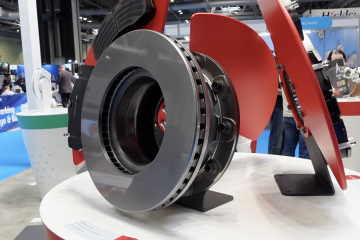More than 300,000 unsafe vehicles could be seen on UK roads, should the government plans to extend the MOT frequency be passed.
Figures from the DVSA show that around 300,000 vehicles fail their first MOT after three years. Moving the MOT frequency to four years, as outlined in the current MOT consultation, poses a higher safety risk to motorists, pedestrians and other road users.
Furthermore, as the number of new vehicles on UK roads are set to be electric powered, these are just as likely to fail the first MOT test, underlining the importance of safeguarding the current MOT frequency at 3-1-1.
DVSA data shows that the failure rate on tyres at first MOT of three years is higher on Battery Electric Vehicles (BEVs) than on diesel vehicles. A total of 57% of all electric vehicles that fail their first MOT test, fail on tyres, compared with 35% of diesel vehicles and 37% of petrol vehicles tested.
As BEVs are heavier than their internal combustion engine counterparts, tyre wear is likely to be more extreme, meaning drivers of these vehicles will be increasingly required to check regularly.
Impact of MOT frequency change on motorists
The Independent Automotive Aftermarket Federation (IAAF) is arguing that motorists are already too ‘detached’ from their vehicle service, repair and maintenance responsibilities, largely due to unrealistic reliability claims and extended warranties from vehicle manufacturers. Moving to an extended MOT frequency will put additional pressures on the testing network and the IAAF is calling on the government to support the industry with more public awareness campaigns on vehicle safety.
“Moving the first MOT test to four years gives motorists the false perception that vehicles are more reliable when the data says otherwise,” commented Mark Field, IAAF Chief Executive. “It also potentially means motorists face worsening problems, higher repair bills and more polluting vehicles if cars remain unchecked for longer periods.”
The MOT consultation includes questions concerning other changes to the MOT, such as more inclusion of vehicle safety systems, such as ADAS, improvements to emissions monitoring and checks on electric vehicle components. While these aspects are welcomed, it is the frequency change being proposed that has the aftermarket concerned.
It is not the first time the MOT has come under attack by the UK government, with proposals to move to a 4-1-1 system consulted on and withdrawn in 2018. There have also been discussions around moving to a 3-2-2 system in the past, while the MOT extension due to the COVID-19 pandemic lasted beyond the lifting of the lockdown, leading to the establishment of an ‘MOT season’.
The consultation closes on 22 March. To register your opinion, click here.



